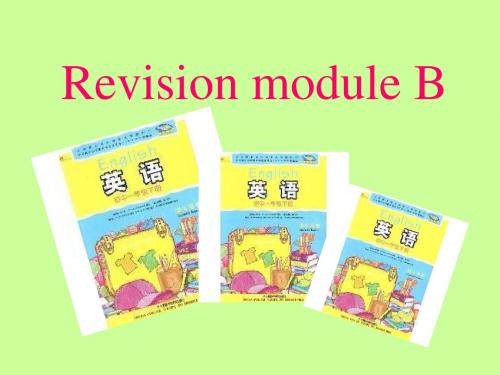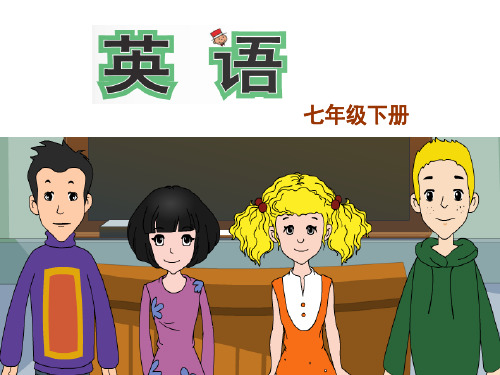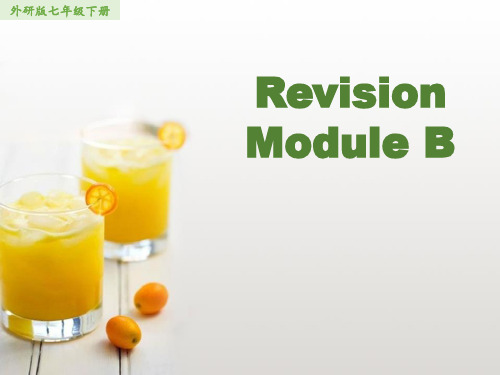复习课2RevisionmoduleB-天津市空中课堂外研版七年级英语下册课件(共44张PPT)
合集下载
外研(新标准)版七年级下Revision module B 教学课件 (共22张PPT)

--- When were you born? --- I was born twelve years ago.
3 Write your and your partner’s answers on your questionnaire. Possible answers
1 I was born in September./ He was born in April.
10 Complete the email with the correct form of the words from the box. You can use some of the words twice.
arrive buy come do go have look take visit
1 when/born? 2 where/born? 3 when/start school? 4 what school/go to when you were seven? 5 ride /a bike/ to school/ when you were eight? 6 how /go to school/ when you were eight? 7 who /play/ with? 8 what games/ play? 9 why /like/ this game? 10 what sports/ like?
No talking. No running. No photos. No swimming.
Now explain these signs with don’t.
Don’t swim. Don’t talk. Don’t take photos.
Don’t run.
7 Rewrite the sentences with what.
3 Write your and your partner’s answers on your questionnaire. Possible answers
1 I was born in September./ He was born in April.
10 Complete the email with the correct form of the words from the box. You can use some of the words twice.
arrive buy come do go have look take visit
1 when/born? 2 where/born? 3 when/start school? 4 what school/go to when you were seven? 5 ride /a bike/ to school/ when you were eight? 6 how /go to school/ when you were eight? 7 who /play/ with? 8 what games/ play? 9 why /like/ this game? 10 what sports/ like?
No talking. No running. No photos. No swimming.
Now explain these signs with don’t.
Don’t swim. Don’t talk. Don’t take photos.
Don’t run.
7 Rewrite the sentences with what.
初中英语外研版七年级下册《Revision_Module_B》课件

Today we went to Tower Bridge on the River Thamesand (8)l_oo_ked at the city. It’s very big! This afternoon we (9) _d_id____ some shopping. Jenny didn’t buy anything, but I (10 ) _b_o_u_g_h_t__ a present for you and I posted it just now. I hope you’ll like it! Say hello to your mum and dad.Emma
He (8) _r_o_d_e__( ride) his bike to school andhe (9) _t_ra_v_e_l_e_d_(travel) by train when hewent on holiday. He often (10) _h_a_d__( go)to the sea and (11) w__e_n_t__(swim) in the sea. He (12) _s_w_a_m_(have) a camera, but it (13) w__as_n__’t(not be ) a modern camera and he (14) _d_id_n_’_t_ta_k_e_( not take) colour photos.
3. They live a happy life today! ___W_h_a_t a__ha_p_p_y__ life they live today!
4. It was wonderful music. _W_h_a_t w_o_n_d_e_rf_ul_m_u_s_ic____ it was!
外研版七下英语RevisionModuleB课件

6. How did you go to school when you were eight?
I walked to school.
7. Who did you play with? I played with my friend, Xiaoming. 8. What games did you play ? We played ball games. 9. Why did you like this game? Because it is interesting.
very famous, like The Ugly Duckling and The Little Match Girl. People still (11)_li_k_e_
to read them today and they can (12) _r_e_ad_
them in many languages.
When did you start school? 4.what school / go to when you were seven?
What school did you go to school when you were seven?
5.ride / a bike / to school / when you were eight? Did you ride a bike to school when you were eight?
4. Complete the passage with the correct form of the words and expression.
be born become come die find go like move read travel try write
I walked to school.
7. Who did you play with? I played with my friend, Xiaoming. 8. What games did you play ? We played ball games. 9. Why did you like this game? Because it is interesting.
very famous, like The Ugly Duckling and The Little Match Girl. People still (11)_li_k_e_
to read them today and they can (12) _r_e_ad_
them in many languages.
When did you start school? 4.what school / go to when you were seven?
What school did you go to school when you were seven?
5.ride / a bike / to school / when you were eight? Did you ride a bike to school when you were eight?
4. Complete the passage with the correct form of the words and expression.
be born become come die find go like move read travel try write
外研版七年级英语下册 Revision Module B课件

特殊疑问句:特殊疑问词+ 一般疑问句+? 回答:要求用完整的句子回答。如: Where was she born ? She was born in Tianjin. Which school did she study last year? She studied in No.1 Middle School.
Now explain these signs with don’t.
7. Rewrite the sentences with what.
1. It is a nice present. _W__h_at_a__ nice present it is!
2. It’s a fine day today. _W__h_a_t _a_f_in_e__d_a_y__ it is today!
I (You, He, She, They)did not work there.
一般疑问句: Did you ( I, he, she, they)work there?
肯定回答:主语+ did. 否定回答:主语+ didn’t.
be 动词: was / were
肯定句:I (He, She) was there. We (You, They) were there.
His first book (7) _c_a_m_e_ out in 1822. He (8)__w_r_o_te_ many stories for children, but older people also (9) __fo_u_n_d_ them interesting. Many of his stories (10) _b_e_c_a_me
否定句:I ( He, She,) was not there. We (You, They) were not there.
+Revision+Module+B+第一课时(课件)2023-2024学年外研版七年级英语下册

7
Review the grammar
Task 1 复习一般过去时态
Complete the sentences with the correct form of the words in brackets. 1. I _w__a_tc_h_e_d__(watch) a cartoon on Saturday. 2. Her father __r_e_a_d___(read) a newspaper last night. 3. We __w__e_n_t__(go) to the zoo yesterday. 4. ___D_i_d___ you ___v_is_it___(visit) your relatives last Spring Festival? 5. I __s_w_e_p_t__(sweep) the floor yesterday. 6. She __f_o_u_n_d__(find) a beautiful butterfly yesterday. 7. —How __w__a_s___(be) Jim’s weekend?
5
Review the grammar
Task 1 复习一般过去时态 Work in pairs.
When were you born?
I was born twelve years ago.
6
Review the grammar
Task 1 复习一般过去时态
主持人采访活动
Where were you born?
Task 2 复习祈使句
祈使句构成 肯定式: 动词原形+宾语. 否定式: Don’t+动词原形+宾语.
11
Review the grammar
2022-2023学年外研版七年级英语下册Module2复习教案

(2)词汇在不同语境中的运用:学生需要学会在具体语境中正确使用所学词汇。
举例:区分doctor在不同情境下的用法,如“a doctor in a hospital”(医院的医生)和“a doctorof philosophy”(哲学博士)。
(3)阅读理解的深入:学生对课文细节的理解可能不够深入,需要通过问题引导、讨论等方式帮助学生挖掘文本内涵。
然而,我也注意到,部分学生在使用一般将来时时,仍然会出现动词形式错误的问题。在接下来的教学中,我需要更加关注这一点,通过更多的练习和指导,帮助学生巩固这一语法点。
此外,小组讨论环节中,学生们表现得相当积极,但在表达观点时,有些学生的语言组织能力还有待提高。我想在之后的课堂上,多设计一些类似的活动,让大家有更多的机会练习口语表达,提高他们的语言组织能力。
举例:针对课文中的描述,提出问题如“How does the character feel about his future job?”,引导学生深入思考。
(4)口语表达能力的提高:学生在小组讨论和角色扮演活动中,可能存在表达不流畅、词汇使用不准确等问题。
举例:教师需指导学生在口语表达时注意语法、词汇的准确性,鼓励学生多练习,提高表达能力。
四、教学流程
(一)导入新课(用时5分钟)
同学们,今天我们将要学习的是《Module 2复习》这一章节。在开始之前,我想先问大家一个问题:“你们有没有想过自己将来想做什么工作?”这个问题与我们将要学习的内容密切相关。通过这个问题,我希望能够引起大家对未来职业规划的兴趣和好奇心,让我们一同探索如何用英语表达我们的未来职业梦想。
2.增强学生文化意识:让学生在讨论未来职业规划的过程中,了解不同职业的文化背景,培养跨文化交际能力;
3.培养学生思维品质:通过阅读理解、课后练习等活动,锻炼学生的逻辑思维和分析能力;
举例:区分doctor在不同情境下的用法,如“a doctor in a hospital”(医院的医生)和“a doctorof philosophy”(哲学博士)。
(3)阅读理解的深入:学生对课文细节的理解可能不够深入,需要通过问题引导、讨论等方式帮助学生挖掘文本内涵。
然而,我也注意到,部分学生在使用一般将来时时,仍然会出现动词形式错误的问题。在接下来的教学中,我需要更加关注这一点,通过更多的练习和指导,帮助学生巩固这一语法点。
此外,小组讨论环节中,学生们表现得相当积极,但在表达观点时,有些学生的语言组织能力还有待提高。我想在之后的课堂上,多设计一些类似的活动,让大家有更多的机会练习口语表达,提高他们的语言组织能力。
举例:针对课文中的描述,提出问题如“How does the character feel about his future job?”,引导学生深入思考。
(4)口语表达能力的提高:学生在小组讨论和角色扮演活动中,可能存在表达不流畅、词汇使用不准确等问题。
举例:教师需指导学生在口语表达时注意语法、词汇的准确性,鼓励学生多练习,提高表达能力。
四、教学流程
(一)导入新课(用时5分钟)
同学们,今天我们将要学习的是《Module 2复习》这一章节。在开始之前,我想先问大家一个问题:“你们有没有想过自己将来想做什么工作?”这个问题与我们将要学习的内容密切相关。通过这个问题,我希望能够引起大家对未来职业规划的兴趣和好奇心,让我们一同探索如何用英语表达我们的未来职业梦想。
2.增强学生文化意识:让学生在讨论未来职业规划的过程中,了解不同职业的文化背景,培养跨文化交际能力;
3.培养学生思维品质:通过阅读理解、课后练习等活动,锻炼学生的逻辑思维和分析能力;
外研英语七年级下册Revision module B(共23张PPT)

4.What school did you go to when you were seven?
I studied in Zhaoben Primary School. 5. Did you ride a bike to school
when you were eight? No, I didn’t.
Who did you play with at the age of ten? 7. what games/play?
What games did you play ? 8. why / like /this game? Why did you like this game?
2. Work in pairs. Ask and answer the questions in Activity 1.
1
2
3
4
5
6
pick leave bring
picked left
brought
make like begin
made liked began
hurry buy take
hurried bought
took
swim win arrive
swam won
arrived
know stop find
Listening and speaking 11. Listen and choose the correct answer. 1. Tony went to London / Hong Kong.
2. It took four / five hours to get there. 3. Tony’s uncle / aunt met them at the
What school did you go to when you were seven? 5. ride / a bike / to school / when you were eight?
I studied in Zhaoben Primary School. 5. Did you ride a bike to school
when you were eight? No, I didn’t.
Who did you play with at the age of ten? 7. what games/play?
What games did you play ? 8. why / like /this game? Why did you like this game?
2. Work in pairs. Ask and answer the questions in Activity 1.
1
2
3
4
5
6
pick leave bring
picked left
brought
make like begin
made liked began
hurry buy take
hurried bought
took
swim win arrive
swam won
arrived
know stop find
Listening and speaking 11. Listen and choose the correct answer. 1. Tony went to London / Hong Kong.
2. It took four / five hours to get there. 3. Tony’s uncle / aunt met them at the
What school did you go to when you were seven? 5. ride / a bike / to school / when you were eight?
外研版七年级下册英语RevisionModuleB

Answers
1 arrived 2 took 3 went 4 came 5 visited 6 visited 7 had 8 looked 9 did 10 bought
11 Listen and choose the correct answer.
1 Tony went to London/ Hong Kong. 2 It took four/ five hours to get there. 3 Tony’s uncle/ aunt met them at the airport. 4 Tony saw a big ship/ a dragon boat. 5 Tony bought a present / some postcards for
9 Complete the passage with the correct form of the expressions from the box.
arm in arm kiss each other shake hands stand close
People from different countries do things in different ways. In China , people usually _s_h_a_k_e__h_a_n_d_s_ when they meet but in some countries, like Russia, people _k_is_s__ea_c_h__o_t_h_e_r. People in the Middle Easts_t_a_n_d_c_l_o_se_ to each other, but people from the US don’t. Chinese girls often walk _a_r_m__i_n_a_r_m___ but people from Britain don’t touch each other very often.
1 arrived 2 took 3 went 4 came 5 visited 6 visited 7 had 8 looked 9 did 10 bought
11 Listen and choose the correct answer.
1 Tony went to London/ Hong Kong. 2 It took four/ five hours to get there. 3 Tony’s uncle/ aunt met them at the airport. 4 Tony saw a big ship/ a dragon boat. 5 Tony bought a present / some postcards for
9 Complete the passage with the correct form of the expressions from the box.
arm in arm kiss each other shake hands stand close
People from different countries do things in different ways. In China , people usually _s_h_a_k_e__h_a_n_d_s_ when they meet but in some countries, like Russia, people _k_is_s__ea_c_h__o_t_h_e_r. People in the Middle Easts_t_a_n_d_c_l_o_se_ to each other, but people from the US don’t. Chinese girls often walk _a_r_m__i_n_a_r_m___ but people from Britain don’t touch each other very often.
Revision Module B 课件(23张PPT)七年级英语(下)外研版

Past tense was were begun broke brought built bought could
不规则动词的过去式
Infinitive Past tense
catch
caught
come
came
do draw drink drive eat fall
did drew drank drove ate fell
学标 动词过去式的变化
一
学标 一般过去时的用法
二
1、整理笔记本 2、背诵 动词不规则变化
学习小组
1星光 2先锋 3追击 4飞梦 5追梦 6拼搏
小组人数
A
B
C
平均得分
6
41
1
9
6
33
0
9
5
41
0
9.6
6
41
1
9
6
23
1
8.3
6
22
2
8
学案中存在的问题
谓语动词的使用没有和主语保持一致 一般过去时的时间状语标志,混淆不清 Be动词和行为动词使用混淆 写作中,日记的格式 写作中上下文的时态前后不统一 一般过去时和一般现在时混淆使用 做题时,在题目上标注,分析题目
went get
got
hoped 15. come came
planned called ate wanted
were
16. say 17. see 18. put 19. read 20. take
said
saw put
read took
动词过去式的变化
构成规则
一般在动词原形末尾 加-ed
结尾是e的动词加-d
外研(新标准)版七年级下Revision module B 教学课件 (共43张PPT)

travel— traveled
die— died
read— read
find— found
write— wrote
Questions:
1. When did Fiona arrive in Qingdao? 2. Who is Carol? 3. Did Carol sit on the rock in Zhanqiao Park? 4. Who did Fiona meet yesterday? Where did they eat?
e.g. We arrived by train on Friday afternoon.
We didn’t by train on Friday afternoon.
arrive
We had dinner together in a Korean restaurant.
We didn’t
have
give went
to
the
park
and
had
a
picnic.
(改为一般疑问句)
__D_i_d__ __y_o_u__ ___g_o___ to the park and __h_a_v_e__ a picnic?
肯定回答: __Y_e_s____, ___w__e____ ____d_id____.
photos(彩色照片) and white photos
today.
in the past.
People listen to the music on the computer today.
People _lis_t_e_n_e_d to the music on the radio in the past.
最新外研版初中七年级英语下册 Revision Module B课件

He (5) _____(have) a telephone, but of
course phela(6y) e__d_______(not send ) emails. His family (7) _________(not have) a cadr.idn’t play
had didn’t send
10. What sports did you like? I like playing basketball.
I was born in Jiaxing in 2000. I went to school at the age of seven. My school was No.1 Primary School. My home is near the school so I went to school on foot every day. I like playing basketball and I also play “Flight Chess” with my friend, Xiaoming. He is as old as I. He was from Chongqi . We were in the same class. We helped and learnt from each other. We were happy when we were in primary school.
When did you start school? 4.4.what school / go to when you were seven?
What school did you go to school when you were seven?
5.ride / a bike / to school / when you were eight?
course phela(6y) e__d_______(not send ) emails. His family (7) _________(not have) a cadr.idn’t play
had didn’t send
10. What sports did you like? I like playing basketball.
I was born in Jiaxing in 2000. I went to school at the age of seven. My school was No.1 Primary School. My home is near the school so I went to school on foot every day. I like playing basketball and I also play “Flight Chess” with my friend, Xiaoming. He is as old as I. He was from Chongqi . We were in the same class. We helped and learnt from each other. We were happy when we were in primary school.
When did you start school? 4.4.what school / go to when you were seven?
What school did you go to school when you were seven?
5.ride / a bike / to school / when you were eight?
- 1、下载文档前请自行甄别文档内容的完整性,平台不提供额外的编辑、内容补充、找答案等附加服务。
- 2、"仅部分预览"的文档,不可在线预览部分如存在完整性等问题,可反馈申请退款(可完整预览的文档不适用该条件!)。
- 3、如文档侵犯您的权益,请联系客服反馈,我们会尽快为您处理(人工客服工作时间:9:00-18:30)。
当我们想表达一种较为强烈的感情,如喜悦、赞叹、惊异、 愤怒、厌恶等时,可以用感叹句。
It’s so beautiful! ①
I love his music!
What a beautiful city! ②
Happy birthday, Tom! I am so angry! Ice cream is the best dessert!
一般过去时
一般过去时
一般过去时可以用来表述过去某个时间发生的事情或行为, 还可以用来描述事物过去的状态或过去经常发生的事情, 句中的谓语要用动词的过去式形式。
常用时间状语:yesterday, 2 years ago, just now, last week / year / night, in the past, once upon a time...
七年级下册 复习课 2 七年级 英 语
内容分析
本节课以七年级下册Revision module B 为素 材,目的是对后六个模块中的语言知识进行 归纳总结、检查评估,对听、说、读、写技 能进行进一步的综合训练,以完成检测评估 的目标。
Let’s watch the video clip.
感叹句
Rewrite the sentences with what.
1. It is a nice present. _W_h_a_t_a_____________ nice present it is!
2. It’s a fine day today. _W_h_a_t_a_f_in_e__da_y_______it is today!
3. They live a happy life today. _W_h_a_t_a_h_a_p_p_y________ life they live today!
4. It was wonderful music. _W_h_a_t_w_o_n_d_e_r_fu_l_m_u_s_i_c _ it was!
※ 在表达请求时,可以加上please; 表达比较强烈的语气时,可以用感叹号。
Please close the door. Sit down, please. Stop! Hurry up!
Don’t be late again. Don’t worry. Be happy.
No talking. No running. No photos. No swimming. Don’t talk. Don’t run. Don’t take photos. Don’t swim.
Listening
1. Tony went to London / Hong Kong. 2. It took four / five hours to get there. 3. Tony’s uncle / aunt met them at the airport. 4. Tony saw a big ship / a dragon boat. 5. Tony bought a present / some postcards for Lingling.
meet- met read- read see- saw send- sent spend- spent swim- swam take- took
试一试
be born become travel write come
was/were born became travelled wrote came
What +a/an +形容词+可数名词单数(+句子的主语和谓语动词) What+形容词+可数名词复数(+句子的主语和谓语动词) What+形容词+不可数名词(+句子的主语和谓语动词)
What + 强调或感叹的部分(+句子的主语和谓语动词)
What a lovely day! What a horrible thing to do! What a beautiful flower(it is)! What nice people(they are)! What nice weather(we’re having)!
Now explain these signs with don’t.
Listening
1. Tony went to London / Hong Kong. 2. It took four / five hours to get there. 3. Tony’s uncle / aunt met them at the airport. 4. Tony saw a big ship / a dragon boat. 5. Tony bought a present / some postcards for Lingling.
move read go find like try die
moved read went found liked tried died问句 及回答
•特殊疑问句
肯定句:
I was born in a small village in Shanxi Province. They were in the country in 1990. He moved to London at twenty-eight. You took a walk this morning.
动词过去式
规则变化
一般动词结尾加-ed 以“不发音的字母e结尾”的动词后 加-d 以“辅音字母 + y结尾”的动词,y 变为i,再加-ed 以“元音字母 + 一个辅音字母结 尾”的重读闭音节动词,先双写辅 音字母,再加-ed
不规则变化
be - was/were buy- bought come- came do- did get- got go- went have- had write- wrote
Let’s watch the video clip.
祈使句
祈使句用来表达叮嘱、劝告、希望、禁止、请求或命令等。
※ 祈使句一般没有主语,说话的对象都是第 二人称“你”或“你们”,所以也可以理 解为省略了主语you;
※ 以动词原形开头,无时态和数的变化;
※ 祈使句的否定形式是在动词原形前加don’t;
